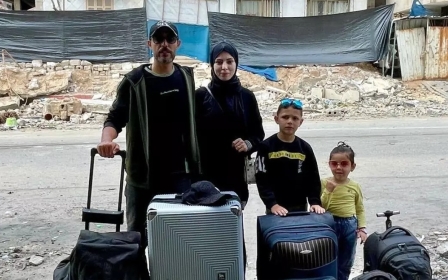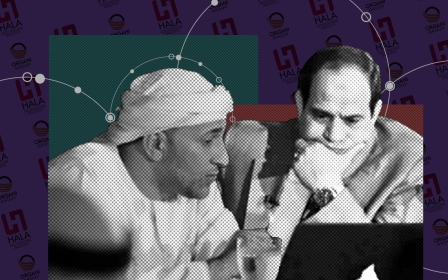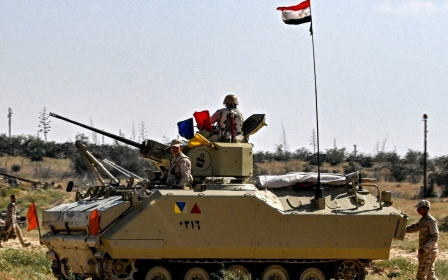ICC condemns retaliation threats after Israeli arrest warrant reports

The International Criminal Court (ICC) has hit out at threats of retaliation against the court and its staff, following days of speculation about arrest warrants being issued for Israeli officials over actions taken during the war on Gaza.
Though the charges have not been confirmed by the ICC, Israeli government ministers have spoken publicly in recent days about the rumoured threat of indictments against its leaders.
Prime Minister Benjamin Netanyahu, Defence Minister Yoav Gallant and Israeli military Chief of Staff Herzi Halevi are believed to be the most likely to be charged, according to multiple media reports.
Netanyahu made a video statement earlier this week condemning potential ICC action as "a scandal on a historic scale".
He said he expected international leaders to use "all the means at their disposal to stop this dangerous move".
Stay informed with MEE's newsletters
Sign up to get the latest alerts, insights and analysis, starting with Turkey Unpacked
On Monday, Axios reported that Congress members from both parties in the US warned the ICC it would retaliate against arrest warrants being issued to Israeli leaders, including by introducing legislation sanctioning ICC officials.
Israel also warned Washington that it would take steps which would lead to the collapse of the Palestinian Authority if the indictments went ahead, according to a separate report in Axios.
The Office of the ICC prosecutor said in a statement on Friday that it welcomed "comments, communications of concerns, and engagement" by elected officials, NGOs and activists, following significant public interest in its investigations.
"The Office seeks to engage constructively with all stakeholders whenever such dialogue is consistent with its mandate under the Rome Statute to act independently and impartially," it said.
"That independence and impartiality is undermined, however, when individuals threaten to retaliate against the Court or against Court personnel should the Office, in fulfillment of its mandate, make decisions about investigations or cases falling within its jurisdiction."
It added that such threats could constitute an offence under Article 70 of the Rome Statute, which prohibits impeding or intimidating court officials by forcing or trying to persuade them not to perform their duties.
"The Office insists that all attempts to impede, intimidate or improperly influence its officials cease immediately."
The ICC was formed in 2002 to prosecute individuals accused of war crimes, crimes against humanity and genocide. The crimes later included the crime of aggression.
There are 124 member states who are party to the Rome Statute, the treaty which established the court.
Under the principle of complementarity, the ICC acts as a court of last resort when member states are unwilling or unable to try heinous crimes themselves.
It can prosecute nationals of member states, as well as individuals who commit crimes on the territory of member states. It also has jurisdiction over cases referred to it by a UN Security Council resolution.
Israel is not a member of the ICC. However, as the state of Palestine was granted membership in 2015, the court can investigate Israeli individuals for crimes committed in the occupied Palestinian territories, which include Gaza, the occupied West Bank and East Jerusalem.
ICC probing Gaza war
In 2021, the ICC opened an official investigation into allegations of war crimes and crimes against humanity committed in occupied Palestine since June 2014.
Chief prosecutor Karim Khan said in October last year that the court also had jurisdiction over crimes committed by Hamas in Israel and by Israelis in Gaza during the current war.
It is not yet clear exactly what the court is looking at in relation to Israeli officials.
International law experts told Middle East Eye it could be: allegations of deliberate starvation; impeding the entry of humanitarian aid into the enclave; direct attacks targeting non-military objects such as hospitals, as well as inhumane treatment of Palestinian detainees.
If Israeli officials are charged, they would have to restrict their travel in and out of the 124 member states of the ICC.
"Member states have a legal obligation to cooperate fully with the court, which includes arresting those subject to an arrest warrant," Eitan Diamond, of the Diakonia International Humanitarian Law Centre in Jerusalem, told MEE.
"Israel and the Israeli officials concerned would not want to take the risk that states would discharge their obligation."
Neve Gordon, professor of international law and human rights at Queen Mary University of London, said the issue would put ICC member states' commitment to international human rights law to the test.
"If, for example, Netanyahu is named on the arrest warrant and he can continue travelling freely and there's no problem, that jeopardises the legitimacy of the ICC itself," he told MEE.
In the event of ICC arrest warrants for Israelis, it is likely that leaders of Hamas will be indicted too, for its role in the 7 October surprise attack on southern Israel that killed 1,140 people, most of whom were civilians.
Under the administration of President Donald Trump, the US - which is not a member of the ICC - was actively hostile towards the court. It imposed economic and travel sanctions on ICC prosecutors after the court launched a probe into possible war crimes committed by the US and its allies in Afghanistan.
President Joe Biden’s administration lifted those sanctions in 2021.
However, the Biden administration has reiterated this week that it does not support any ICC investigation into Israeli crimes in Gaza because "we don't believe that they have the jurisdiction".
Middle East Eye delivers independent and unrivalled coverage and analysis of the Middle East, North Africa and beyond. To learn more about republishing this content and the associated fees, please fill out this form. More about MEE can be found here.





